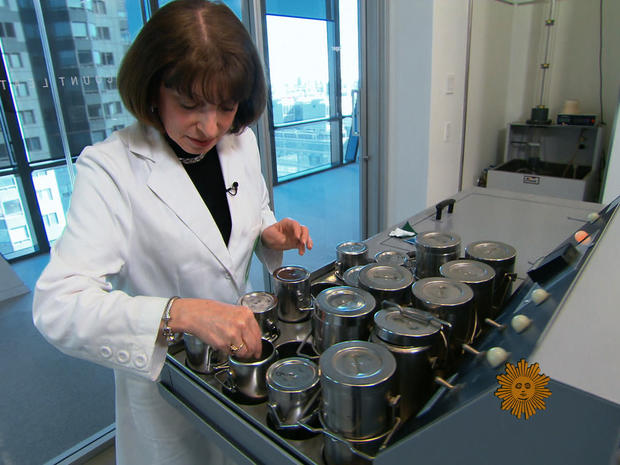Earning Good Housekeeping's Seal of Approval
(CBS News) The phrase SEAL OF APPROVAL is part of our language . . . in no small part because of one very familiar magazine. Martha Teichner shows us the labwork behind the logo:
Peter Thomas Roth had been on QVC selling his anti-aging skin products before, with so-so results. But then, on January 28, he hit the jackpot.
On that date, he told Teichner, "We sold $2.2 million of retail on QVC, and we had a wait list."
What changed? A little sticker, going on every box. Roth has no doubt that earning the Good Housekeeping Seal made all the difference. "Having this nice little seal on it sealed the deal," he laughed.
Far from being some stodgy relic of your mother or grandmother's era, the 128-year-old Good Housekeeping means business, and always has.
The Seal of Approval dates back to 1909, said Rosemary Ellis, editor-in-chief of Good Housekeeping magazine.
"If we were starting a magazine today, we would never name it 'Good Housekeeping,'" Ellis said.
The magazine promoted itself as "a family journal . . . conducted in the interest of the higher life of the household."
But feminists, before you sneer, consider what that involved. The magazine was vocal in pushing for passage of the Pure Food and Drug Act in 1905. "There was no Federal Trade Commission, there was no Consumer Product Safety Commission when the magazine started," Ellis said.
If you've never thought of Good Housekeeping as controversial - radical, even -- think again.
They stopped taking cigarette ads in 1952, twelve years before the Surgeon General's report came out. "Because research was coming out of Europe that very clearly linked cigarette smoking to cancer, and we didn't want that in the magazine," said Ellis.
She introduced Teichner to the Good Housekeeping "Wall of Shame" -- products called out in the magazine for being dangerous or deceptive.
A children's Halloween costume, for example."They're supposed to be flame retardant," Ellis said. "This one went up in flames in 1.7 seconds."
The magazine's world-famous research labs are the result of its history of activism. No product is advertised between its covers without being tested and approved. If a product with the Seal turns out to be defective, Good Housekeeping -- not the manufacturer -- will replace it or refund your money.
Good Housekeeping evaluates just about anything anybody (but especially women) might consider buying, from blenders to bathing suits.
"Slimming bathing suits, as a matter of fact," said Carolyn Forte of the Good Housekeeping Research Institute. "We're in the process now with evaluating just how well they slim."
Fabric swatches were abrasion tested. Whether it's swim suits, or the knees of reinforced jeans, the durability of a product or its effectiveness is studied scientifically.
For anti-aging creams, testers apply a vacuum to the skin. The vacuum is released, and an optical probe looks at how the skin relaxes, to give a measure of firmness. The test is then repeated eight weeks later.
Teichner's opinion on frozen waffles was solicited. She sampled several and was quizzed by Good Housekeeping testers: "Does this taste buttery? Is it crispy? Is it gummy? Is it wet?"
Teichner named her half-hearted preference, "even though it tasted a little underdone. But I wasn't thrilled with any of them."
Good Housekeeping estimates that 21 million people read each issue. With other magazines folding, it's thrived by understanding what successive generations of women want.
In 2009, when the Seal turned 100, the magazine introduced its new Green Seal. Benjamin Moore Paints applied for its environmentally-friendly Natura line.
Benjamin Moore executive Carl Minchew was thrilled when the paint qualified. New labels with the Seal have just been printed.
"I'm not, like, a big reader of the magazine, but I knew the name and I knew Good Housekeeping, and it stood for something in my mind," Minchew said.
Something as old-fashioned as the commodity Good Housekeeping has successfully marketed for 128 years: trust.
For more info:
